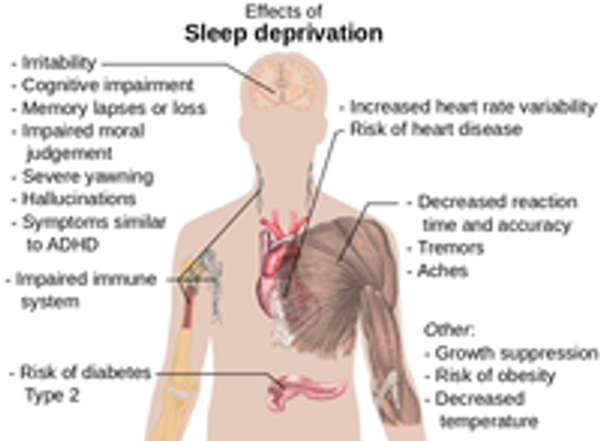Sleep – Wherefore art thou?
Posted by Annette Hasalone, N.D. on 6th Mar 2015
When we sleep well, we wake up feeling refreshed and ready for the day. Sleep affects how we perform, feel and even how we look. A lack of sleep can have a major impact on our overall quality of life. To get the most from sleep, quantity is as important as quality. Most people require a full 8 hours of uninterrupted sleep to leave their bodies and minds rejuvenated for the next day. If our sleep is cut short or interrupted, the body doesn’t have time to complete the necessary phases for muscle repair, release of hormones regulating growth and appetite, and memory consolidation.
Our sleep should follow a set pattern of alternating REM (rapid eye movement) and NREM (non-rapid eye movement) throughout the night and the cycle repeats about every 90 minutes. There are 4 stages of sleep along with REM:
Stage 1: Between being awake and falling asleep then light sleep.
Stage 2: Onset of sleep, we become disengaged from the world around us, our breathing and heart rate become regular, and are body temperature drops.
Stage 3 and 4: This is the most restorative sleep as our blood pressure drops, breathing slows down, and muscles relax as blood supply is increased. During these stages our tissue growth and repair takes place and our hormones are released.
REM: We only spend about 25% of our sleep time in REM sleep and this is the last in the stages which takes place about every 90 minutes. During REM our brain and body receive energy which supports our daytime performance. Our brain is active during REM and our eyes dart back and forth as we dream. Our muscles are turned off and we are immobile and totally relaxed.
A good night’s sleep promotes a healthy immune system and helps to balance our body. Proper sleep helps with maintaining healthy weight by regulating the hormones ghrelin and leptin that play a vital role in hunger and fullness. When we are deprived of sleep, we may need to eat more, which can lead to weight gain.
A good night’s sleep is the cornerstone of good health. Impaired sleep can cause a variety of problems, diseases, and disorders. There are several factors that can contribute to poor sleep not the least of which is vitamin and mineral deficiencies. There are three nutrients that, if deficient, can contribute to sleep problems.
- Magnesium deficiency contributes to insomnia. Studies have shown that insomnia is one of the symptoms of magnesium deficiency. Supplement Magnesium and eat more dark leafy greens, pumpkin seeds, beans and lentils.
- Potassium deficiency contributes to difficulty staying asleep. Potassium is part of adrenal hormone balance. Supplement Potassium and eat more leafy greens, avocados, baked potatoes, and beans.
- Vitamin D3 deficiency contributes to excessive daytime sleepiness. Stress is the main factor behind Vitamin D deficiency and studies have found a strong correlation between daytime sleepiness and Vitamin D deficiency. Supplement Vitamin D3 and eat more swordfish, salmon, and tuna.
Magnesium and Potassium are synergistic and the combination will remove night time leg cramps for most people. Less cramps equals more sleep. Most people are low or deficient in both of these vital minerals.
Other tips to help you get a restful nights sleep:
1.Cover your windows with blackout shades or drapes to ensure complete darkness. Even the tiniest bit of light in the room can disrupt your pineal gland's production of melatonin and the melatonin precursor serotonin, thereby disrupting your sleep cycle.
I caution people to stay away from Melatonin supplements unless it is recommended by a health professional. Many people are sensitive to this hormone and it can cause more problems than it solves.
Get rid of night-lights, and don’t turn on any light during the night, even when getting up to go to the bathroom. If you have to use a light, install "low blue" light bulbs in your bedroom and bathroom. These glow with amber light that will not suppress melatonin production.
2.Keep the temperature in your bedroom at or below 70 degrees F. Many people keep their homes and bedrooms too warm. Studies show that the optimal room temperature for sleep is quite cool, between 60 to 68 degrees F.
3.Move alarm clocks and other devices away from your head. If these devices are a must, keep them as far away from your bed as possible, at least three feet.
4.Reduce use of light-emitting technology, such as your TV, cell phone, tablet, and computer before going to bed. These light sources will suppress melatonin production, which will hamper your ability to fall asleep, as well as increase your cancer risk (melatonin helps to suppress harmful free radicals in your body and slows the production of estrogen, which can contribute to cancer). Turn off all gadgets at least one hour prior to bedtime.
Want to get more Magnesium and Potassium to help you sleep better? Try Angstrom Mineral “Relax”!

